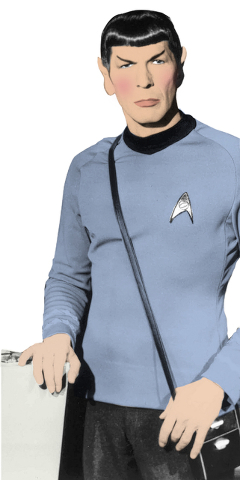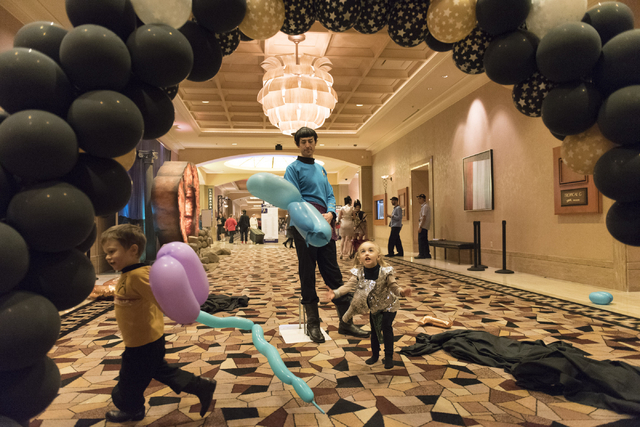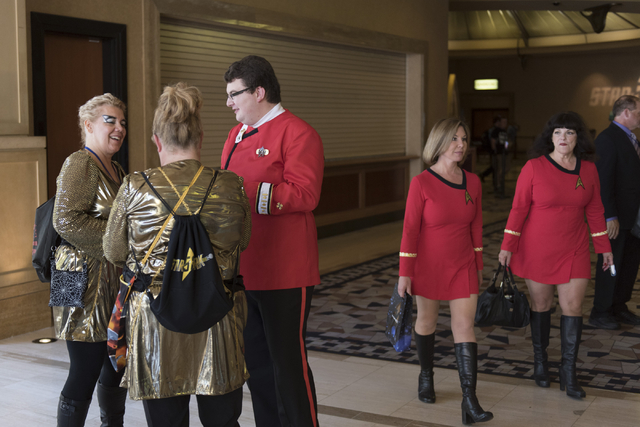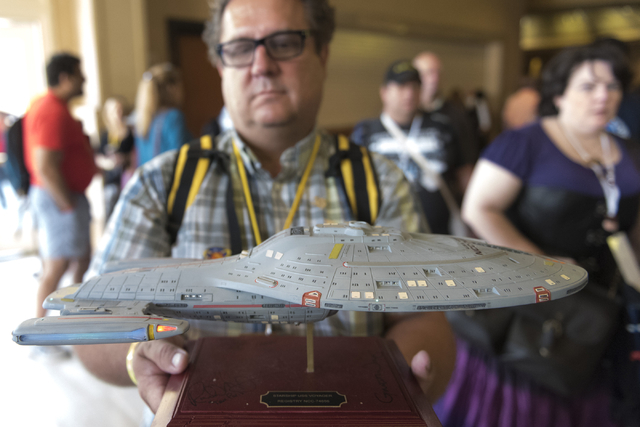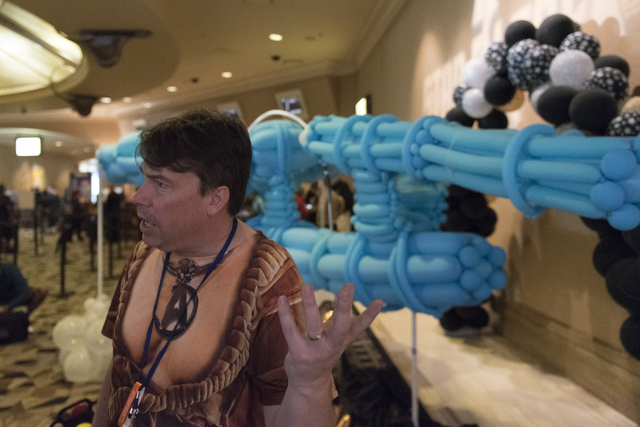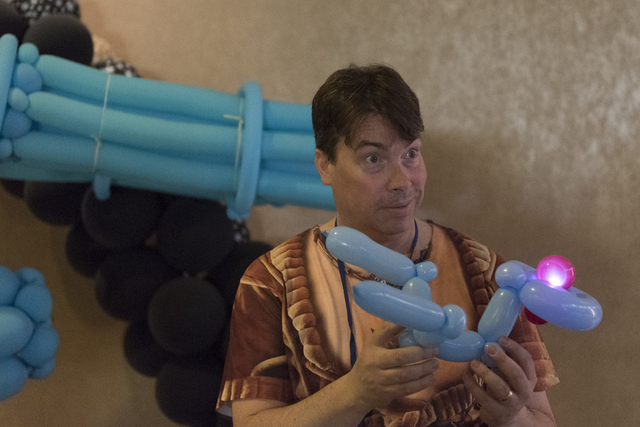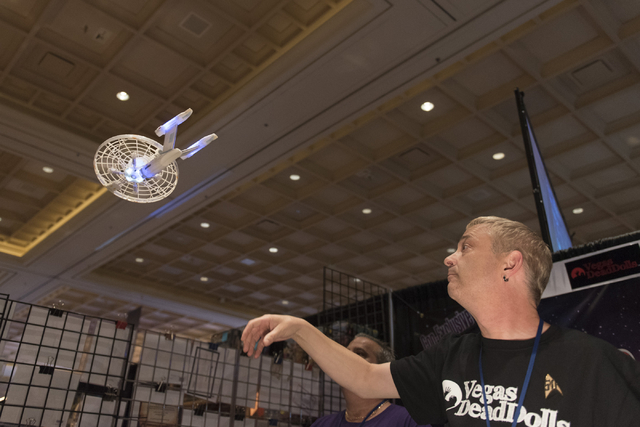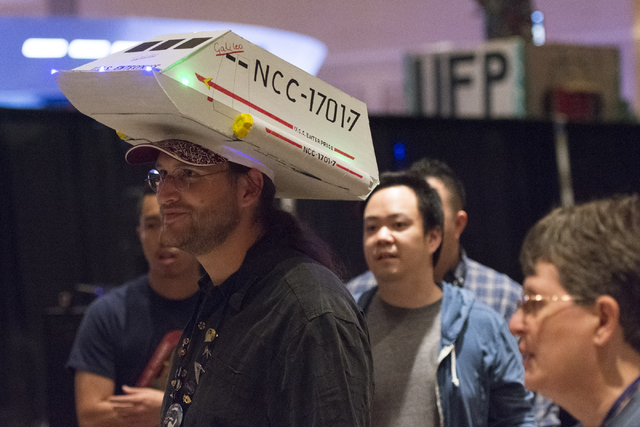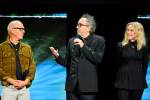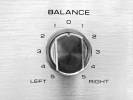Why 50 years of ‘Star Trek’ is not enough
These are the voyages …
To figure out why a cheap-looking science fiction drama with ambitiously big ideas continues to intrigue generations of viewers a half-century after its launch.
It was 50 years ago this week, on Sept. 8, 1966, that “Star Trek: The Original Series” — or, as it was known back then, just “Star Trek” — premiered on the NBC television network.
It ran three seasons but in the half-century since has served as the genesis of 13 feature films, one animated series, four additional live-action series (with another set to premiere in 2017), and a galaxyful of novels, games, conventions and allied products.
Make fun if you must, but “Star Trek” has influenced pop culture, technology and even viewers’ attitudes in ways few TV programs have.
For Bob Davis of Grand Junction, Colorado, who attended last month’s “Star Trek” convention at the Rio in full Talosian dress, it’s the series’ “fantastic appeal.”
“Star Trek” was part of the Space Age ’60s, when everybody wanted to be an astronaut, he recalls, and, in “Star Trek,” “you’ve got characters who are really strong and spoke to everybody in one way or another.”
Bob’s wife, Andrea — decked out in Romulan attire at the convention — notes, too, that they were using technology we have now. “Of course, we didn’t know that, but their communicators are basically our cellphones.”
Roger Godin, a Las Vegas balloon artist who created an impressive scale-model balloon rendition of the Enterprise at the convention, likes that “Star Trek” depicts a world in which war, hunger and social problems had been eliminated and “we did not destroy our world. Mankind had gone on and even takes care of one another and our world.”
Andrea Lipomi, owner of Feetish Spa Parlor in downtown Las Vegas, saw the original series as a kid but didn’t become hooked on the franchise until its TV sequel, “Star Trek: The Next Generation.”
“The characters are so lovable, and there’s usually a good message in there somewhere about social justice and treating other people the way you should treat other people,” Lipomi says.
Lipomi also is proof that “Trek” fans aren’t necessarily as humorless about the series as stereotypes would have you believe. She went to last year’s convention dressed as a Borg “Formula Four Of Nine Housekeeping Droid.” (Trust us: “Star Trek” fans will find that hilarious.)
But first things first: As beloved as it is among fans, “Star Trek” wasn’t the first work of science fiction to explore serious themes.
“I’m a science fiction person, and I like ‘Star Trek’ but I’m not a Trekkie,” says Felicia Campbell, a UNLV English professor who teaches science fiction classes and also is executive director of the Far West Popular Culture Association.
“One of the things about science fiction is that it allows us to discuss controversial topics and things like that at a distance because, if they happen on another planet or something, they don’t necessarily carry all the freight that happens when you’re talking about the American South or whatever,” Campbell says. “So, you can look at discrimination and all of those things with some distance.”
From the start, “Star Trek” explored such themes as prejudice, bigotry and discrimination, albeit cloaked in science fiction.
“I think it’s hard to separate something and say it’s an absolutely new thing that hasn’t shown up somewhere else,” Campbell says, but “Star Trek” did explore serious issues “with intelligence, and the characters are so memorable.”
Katherine Keller, “culture vulture editor” for the comics web zine “Sequential Tart” (www.sequentialtart.com), says it’s the series’ willingness to tackle big ideas that, combined with good storytelling, has allowed it to (ahem) live long and prosper.
Keller discovered “Star Trek” by watching the original series episode “The City on the Edge of Forever” — now considered one of the series’ best episodes — at the age of 7 at a friend’s house. (The plot involves time travel and the perils of changing history in ways that could cause harm in the future.)
“I was surprised to see such a moral dilemma and such hard questions asked by a TV show, and one meant to be just casual entertainment,” she says.
Another reason “Star Trek” has aged well, and why it also appeals to other cultures, is that it had ethnic and racial diversity at a time when almost nothing else on TV did, Keller says.
“Star Trek” also showed women having positions of power and doing things, Keller says. Uhura, played by actress Nichelle Nichols, “was a lieutenant. She was an officer. She was on the bridge, and she was doing things, and you didn’t see a lot of that on TV, especially then.”
“Star Trek” may have been cheesy at times, says Andrew Kerr, planetarium director at the College of Southern Nevada, “but it was a very groundbreaking show in a lot of respects. Everyone was essentially colorblind. In that respect, it tried to give a new normalcy to the way people thought.”
The show’s influence also can be seen in the technology it featured and, even, inspired. According to William Culbreth, an associate professor in UNLV’s mechanical engineering department, Velcro — although already being used in the space program by NASA — was introduced to the American public in an early “Trek” episode when its signature ripping sound was heard as Kirk pulled a communicator off of his belt.
Similarly, the show featured people reading books on computer screens, voice input and output from computers, and even “impulse power,” now known as “ion drives” and used on satellites, Culbreth says.
“Star Trek” also was influential in the interest it helped to create in space, science, technology and engineering, as well as in simply exploring stuff as articulated in the show’s famous, if split-infinitived, opening credo.
“I’ve never been a huge fan,” Kerr says. “But I kind of approach it from being a planetarium director, and it’s great for space and exploration. It was great for NASA. It was great for an entire generation that grew up being exposed to wild ideas and then seeing those wild ideas come to fruition.
“It gave a kind of realism to space travel. It gave a realism to the idea of aliens. It gave a realism to, kind of, the idea of the future being this cool place,” Kerr says, all wrapped up in a spirit of optimism that was, even then, “a response to tumultuous times.”
Read more from John Przybys at reviewjournal.com. Contact him at jprzybys@reviewjournal.com and follow @JJPrzybys on Twitter.





